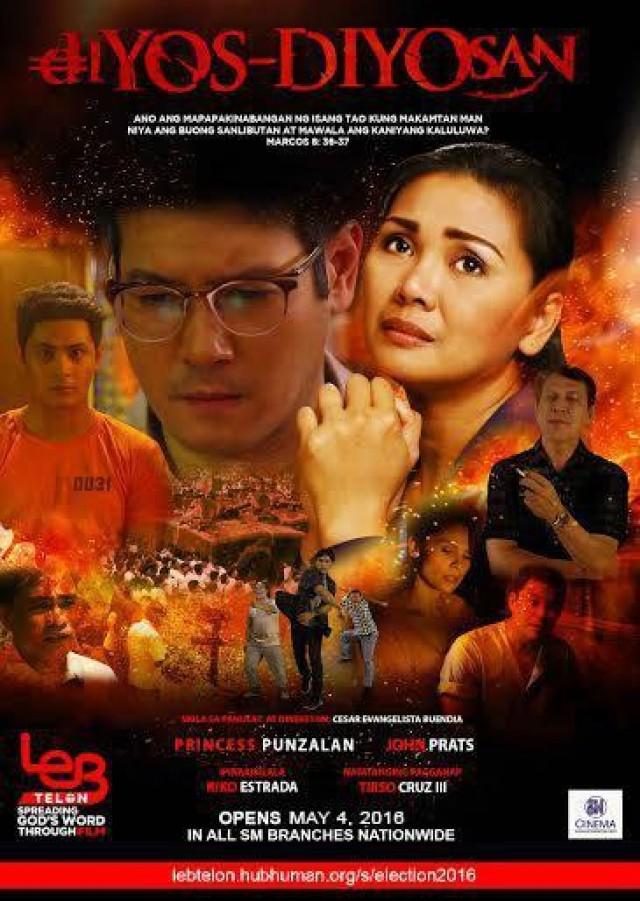‘Diyos-Diyosan’ opens with brownface and it goes further south after that
There were 25 people watching "Diyos-Diyosan" on its premiere day and in this writer's opinion, there were 25 too many people watching the movie. It runs for two hours and 20 minutes, detailing Bernard Mojica's rise to power.

"Diyos-Diyosan" chronicles the godlessness in government through Mojica (played by John Prats with inexplicable brownface at the start) and the movie doubles as a warning against choosing a leader who doesn't surrender to the will of God. The movie spans 30 years and we see Mojica transition from a foul-mouthed teen to a cocky frat man and eventually, a governor who lets 600 people die...because he is inherently evil, as all men who are distant from God are or so the film would have you believe.
Mojica's journey begins in 1986, when he marched with his classmates at EDSA to help overthrow a dictator. He graduates a valedictorian the same year, but a few days before that, we see him walking home with his favorite high school teacher Estrella Subido or Ma'am Estrelle (played by Princess Punzalan).
They make fun of a "Jesus is Alive" center and Ma'am Estrelle tells Bernard that if a divine being did exist, such a powerful entity would not allow the horrors of Martial Law to have happened.
"Tinorture ako at ginahasa ng limang pulis," Ma'am Estrelle said, adding that she was pregnant when the rape happened and that because of the violent act, an unspecified person (likely a doctor) told her that she would not be able to bear children. The horrors made her cry for a revolution.
If this sounds at all interesting, it's because this review wishes to fulfill a promise of sense and coherence to the reader—a promise the film didn't even make to its potential viewer. The crew, Punzalan, and Prats are earnest, but not even they should have seen this "Diyos-Diyosan". But, fortunately, we live in a free country and people have the right to share their beliefs with other people without fear of being silenced permanently.
The film is harmful piece of propaganda, not because it contains a strong "Jesus saves" message, but because it makes light of very serious issues like rape, miscarriage, trauma, the psychology of abandoned children, fraternities and hazing, redemption, and the revolution.
It demeans the sacrifices of people who have taken to the streets to bring about real change—not just in the Philippines, but around the world. The Civil Rights Movement, the Stonewall Riots, and the People Power Revolution may not have completely removed the ills plaguing society, but the world is a little freer in their wake.
Worst of all, it makes a caricature of corruption. It reduces the cunning and manipulative politician into an easily identifiable, unsavory character. We've seen the devil be elected and he did not look like this disgusting stereotype.
He looked shiny and full of promise—and he was definitely not an atheist. "Diyos-Diyosan" seems to suggests that thieving politicians who have been elected are not religious, when it has been quite the opposite. He quotes the bible. He was in church. He shook hands with bishops and sometimes, even the Pope.
But in the fictional world of "Diyos-Diyosan", the University of the Philippines controls the Philippines via the fraternity Gamma Alpha Delta or GAD. They have chapters in other universities and colleges, but UP Diliman is where the demise of the country is plotted by frat men who graduate and become lawyers, doctors, Supreme Court justices, and other key professionals.
GAD is a network of learned "brads" who operate like Hydra, the terrorist enemy of The Avengers. They have no qualms taking a piss on neophytes (shown onscreen sans genitalia) or buying every single vote available for sale so they can...um...protect a drug lord sponsor that they wouldn't have otherwise needed to protect if they didn't have them to ask for money for a presidential campaign?
Yeah, that sounds right.
The sad thing about "Diyos-Diyosan" is that Mojica runs the Philippines to the ground and the power of prayer didn't even work. Or maybe it did? He raises his hand to heaven and asks for forgiveness in the end...and the Lord giveth (as He usually does). But what about the fact that the country was ravaged by storms and the economy went to the pits?
Mojica's soul is redeemed. The rest of the Philippines keep praying. —KG, GMA News




